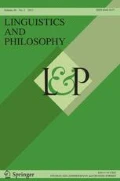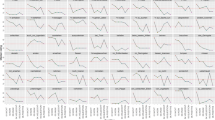Abstract
Linguists often sharply distinguish the different modules that support linguistics competence, e.g., syntax, semantics, pragmatics. However, recent work has identified phenomena in syntax (polarity sensitivity) and pragmatics (implicatures), which seem to rely on semantic properties (monotonicity). We propose to investigate these phenomena and their connections as a window into the modularity of our linguistic knowledge. We conducted a series of experiments to gather the relevant syntactic, semantic and pragmatic judgments within a single paradigm. The comparison between these quantitative data leads us to four main results. (i) Our results support a departure from one element of the classical Gricean approach, thus helping to clarify and settle an empirical debate. This first outcome also confirms the soundness of the methodology, as the results align with standard contemporary accounts of scalar implicature (SI). (ii) We confirm that the formal semantic notion of monotonicity underlies negative polarity item (NPI) syntactic acceptability, but (iii) our results indicate that the notion needed is perceived monotonicity. We see results (ii) and (iii) as the main contribution of this study: (ii) provides an empirical interpretation and confirmation of one of the insights of the model-theoretic approach to semantics, while (iii) calls for an incremental, cognitive implementation of the current generalizations. (iv) Finally, our results do not indicate that the relationship between NPI acceptability and monotonicity is mediated by pragmatic features related to SIs: this tells against elegant attempts to unify polarity sensitivity and SIs (pioneered by Krifka and Chierchia). These results illustrate a new methodology for integrating theoretically rigorous work in formal semantics with an experimentally-grounded cognitively-oriented view of linguistic competence.
Similar content being viewed by others
References
Bard E. G., Robertson D., Sorace A. (1996) Magnitude estimation of linguistic acceptability. Language 72(1): 32–68
Borkin A. (1971) Polarity items in questions. Chicago Linguistics Society 7: 53–62
Chemla, E. (2008). Présuppositions et implicatures scalaires: études formelles et expérimentales. PhD thesis, EHESS.
Chemla E. (2009a) Presuppositions of quantified sentences: Experimental data. Natural Language Semantics 17(4): 299–340
Chemla E. (2009b) Universal implicatures and free choice effects: Experimental data. Semantics and Pragmatics 2(2): 1–33
Chemla, E., & Schlenker, P. (in press). Incremental vs. symmetric accounts of presupposition projection: An experimental approach. Natural Language Semantics. doi:10.1007/s11050-012-9080-7.
Chemla E., Spector B. (2011) Experimental evidence for embedded scalar implicatures. Journal of Semantics 28(3): 359–400
Chierchia G. (2004) Scalar implicatures, polarity phenomenon, and the syntax/pragmatic interface. In: Belleti A. (Ed.), Structures and beyond. Oxford University Press, Oxford
Chierchia G. (2006) Broaden your views: Implicatures of domain widening and the “logicality” of language. Linguistic inquiry 37(4): 535–590
Chierchia, G., Fox, D., & Spector, B. (forthcoming). The grammatical view of scalar implicatures and the relationship between semantics and pragmatics. In P. Portner, C. Maienborn, & K. von Heusinger (Eds.), Handbook of semantics. Berlin: Mouton.
Chomsky, N. (1959). Syntactic structures (The Hague: Mouton, 1957). Review of verbal behavior by BF Skinner. Language, 35:26–58.
Cowart W. (1997) Experimental syntax: Applying objective methods to sentence judgments. Thousand Oaks, CA: Sage
Evans J. St. B. T., Barston J. L., Pollard P. (1983) On the conflict between logic and belief in syllogistic reasoning. Memory & Cognition 11(3): 295–306
Fauconnier G. (1975a) Polarity and the scale principle. Chicago Linguistics Society 11: 188–199
Fauconnier G. (1975b) Pragmatic scales and logical structure. Linguistic Inquiry 6(3): 353–375
Fauconnier G. (1978) Implication reversal in a natural language. In: Guenther F., Schmidt S.J. (Eds.), Formal semantics and pragmatics for natural languages. D. Reidel Publishing Company, Dordrecht, pp 289–301
Fox, D. (2006). Free choice and the theory of scalar implicatures. Unpublished manuscript.
Gajewski, J. R. (2005). Neg-raising: Presupposition and polarity. PhD thesis, MIT.
Geurts B., van der Slik F. (2005) Monotonicity and processing load. Journal of Semantics 22(1): 97–117
Giannakidou A. (1999) Affective dependencies. Linguistics and Philosophy 22: 367–421
Grice P. (1967/1989) Logic and conversation. In Studies in the ways of words. Harvard University Press, Cambridge, MA
Guerzoni, E. (2003). Why even ask? On the pragmatics of questions and the semantics of answers. PhD thesis, MIT.
Heim I. (1984) A note on negative polarity and downward entailingness. Proceedings of NELS 14: 98–107
Homer, V. (2010). Presuppositions and NPI licensing. Ms., UCLA.
Homer, V. (in press). Domains of polarity items. Journal of Semantics.
Horn, L. (1972). The semantics of the logical operators in English. PhD thesis, UCLA.
Israel M. (1996) Polarity sensitivity as lexical semantics. Linguistics and Philosophy 19: 619–666
Israel M. (2011) Grammar of polarity: Pragmatics, sensitivity and the logic of scales. Cambridge University Press, Cambridge
Kadmon N., Landman F. (1993) Any. Linguistics and Philosophy 4(2): 279–298
Kanazawa M. (1994) Weak vs. strong readings of donkey sentences and monotonicity inference in a dynamic setting. Linguistics and Philosophy 17(2): 109–158
Krifka M. (1995) The semantics and pragmatics of polarity items. Linguistic Analysis 25: 209–257
Ladusaw, W. (1979). Polarity sensitivity as inherent scope relations. PhD thesis, University of Texas Austin.
Lahiri U. (1998) Focus and negative polarity in Hindi. Natural Language Semantics 6: 57–123
Levinson, S. (2000). Presumptive meanings: The theory of generalized conversational implicatures. Cambridge, MA: MIT.
Linebarger, M. C. (1980). The grammar of negative polarity. PhD thesis, MIT.
Linebarger M. C. (1987) Negative polarity and grammatical representation. Linguistics and Philosophy 10: 325–387
Montague R. (1974) Formal philosophy: Selected papers of Richard Montague. Yale University Press, New Haven CT
Rothschild, D. (2006). Non-monotonic NPI-licensing, definite descriptions and grammaticalized implicatures. In Proceedings of SALT (Vol. 16). Ithaca, NY: CLC Publications.
Schmerling, S. F. (1971). A note on negative polarity. In Papers in linguistics (Vol. 4.1, pp. 200–206). Champaign, IL: Linguistic Research Inc.
Schütze C. T. (1996) The empirical base of linguistics: Grammaticality judgments and linguistic methodology. University of Chicago Press, Chicago
Spector, B. (2003). Scalar implicatures: Exhaustivity and Gricean reasoning. In B. ten Cate (Ed.), Proceedings of the eighth ESSLLI student session, Vienna, Austria. (Revised version in Spector (2007b)).
Spector, B. (2006). Aspects de la pragmatique des opérateurs logiques. PhD thesis, Université Paris 7, Denis Diderot.
Spector B. (2007a) Aspects of the pragmatics of plural morphology: On higher-order implicatures. In: Sauerland U., Stateva P. (Eds.), Presuppositions and implicatures in compositional semantics. Palgrave-Macmillan, New York
Spector B. (2007b) Scalar implicatures: Exhaustivity and Gricean reasoning. In: Aloni M., Dekker P., Butler A. (Eds.), Questions in dynamic semantics, volume 17 of Current research in the semantics/pragmatics interface. Elsevier, Amsterdam, pp 225–249
Sprouse J. (2011) A test of the cognitive assumptions of magnitude estimation: The cognitive assumptions of magnitude estimation do not hold for acceptability judgments. Language 87: 274–288
Tarski A. (1944) The semantic concept of truth: And the foundations of semantics. Philosophy and Phenomenological Research 4: 13–47
van Rooij R., Schulz K. (2004) Exhaustive interpretation of complex sentences. Journal of Logic, Language and Information 13(4): 491–519
von Fintel K. (1999) NPI-licensing, strawson-entailment, and context-dependency. Journal of Semantics 16(1): 97–148
Zwarts F. (1996) Facets of negation. In: van der Does J., Eijck J. (Eds.),Quantifiers, logic, and language. CSLI Publications, Stanford, pp 385–421
Zwarts F. (1998) Three types of polarity. Plurality and Quantification 69: 177–238
Author information
Authors and Affiliations
Corresponding author
Rights and permissions
About this article
Cite this article
Chemla, E., Homer, V. & Rothschild, D. Modularity and intuitions in formal semantics: the case of polarity items. Linguist and Philos 34, 537–570 (2011). https://doi.org/10.1007/s10988-012-9106-0
Published:
Issue Date:
DOI: https://doi.org/10.1007/s10988-012-9106-0




